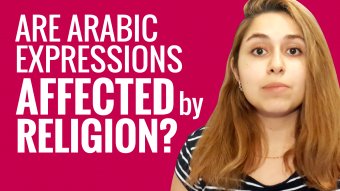Intro
|
| Hi everybody! Nora here. Welcome to Ask a Teacher, where I’ll answer some of your most common Arabic questions. |
| The Question |
| The question for this lesson is: Are Arabic expressions affected by religion? |
| Explanation |
| There are a lot of expressions in Arabic that have Islamic origins. The Quran, which is the Holy book of Muslims, was originally written in Arabic. Islam itself emerged from the Gulf region, which is historically an Arabic-speaking region. So, it’s no wonder that even modern day Arabic is heavily influenced by Islam. These expressions shifted from being specifically religious to being purely cultural, meaning that many non-muslim Arabs use them as well. |
| Let's see some of these expressions: |
| First we have In shaa Allah. |
| إن شاء الله |
| ʾin šāʾ al-lah |
| In shaa Allah literally means "if God wills." It implies that everything happens with the will of God and only if God wills it. We use this expression after we say that we’ll do something, or that something will happen, or is expected to happen. For example, “I will meet you at 6 o’clock, in shaa Allah.” Notice the uncertainty in this expression. Many people exploit this expression and use it to mean that they probably won't do what they said they would, so be careful! |
| Next we have: al hamdu lillaah. |
| الحمد لله |
| al-ḥamdu lillah |
| Al hamdu lillah literally means "Thanks be to God." We use this expression not only when something good happens, but also if something bad happened. The implications is that it could've been worse, so we should be thankful to God anyway. Here’s a sentence example: “I got into an accident, but I came out of it with some bruises. al hamdu lillah!” |
| Now let's see the expression rabbenā maʿāk. |
| رَبِّنا مَعاك |
| rabbenā maʿāk |
| This one has many versions in different dialects. We’re looking at the Egyptian version. It literally means "May God be with you." Egyptians use it when they basically want to say "good luck," implying that godly power is way stronger and more important than luck. For example, “Good luck on your exams!” rabbenā maʿāk fi el emteḥan. The Levantine version of this is: |
| الله يعينك |
| Allāh yʿiinak |
| And there are many other versions, of course. You can use them on their own, of course, as long as they’re in context. |
Outro
|
| I hope you like our lessons, and I will see you in the next episode, in shaa Allah! |



Comments
HideWhat Arabic learning question do you have?
Hi zakari!
Thank you for sharing that interesting note! 😊 نعم، اللغة العربية تُستخدم على نطاق واسع في دول الشرق الأوسط وتُستخدم بشكل متفرق في المجتمعات المسلمة حول العالم. (Na‘am, al-lughah al-‘arabiyyah tustakhdam ‘ala niṭāq wāsi‘ fī duwal al-sharq al-awsat wa tustakhdam bishakl mutafarriq fī al-mujtama‘āt al-muslimah hawl al-‘ālam.) (Yes, Arabic is widely used in Middle Eastern countries and is used sporadically in Muslim communities around the world.)
Feel free to let us know if you have any questions. شكراً (Shukran, "Thank you")
Team ArabicPod101.com
Arabic is widely spoken in the middle Eastern countries and sparsely use in Muslim communities around the world 🙏
Hi Fiona,
Dialects are very tricky and specific indeed. However, many people prefer to learn MSA before moving onto one, but some people don't :)! Good luck on your Arabic learning journey!
Nora
Team ArabicPod101.com
👍
Nice to see a Levantine phrase.
I am learning Jerusalem/Levantine Arabic in conversation classes, and subscribed to Arabic Pod to help me with reading and writing Arabic. I thought it might be useful for m6 speaking too- but there is little to no content using Levantine dialect, so not really of much use, as learning standard Arabic is confusing my learning in Palestinian Arabic conversation!